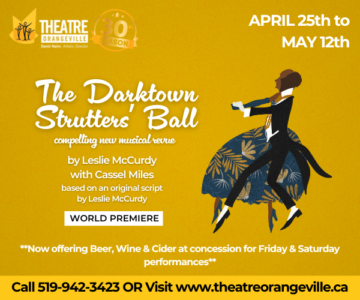Spotty apples, sleepy bees and mad economists
Spotty Apples, Sleepy Bees and Mad Economists. Miscellany from Douglas G. Pearce’s Countryside Digest.
Pea Soupers
“It’s always amazed me that Canada exports massive amounts of grains and beans to places such as South America, the Middle East, Africa, China and India, where they are cooked whole in many delicious ways. However, we don’t eat much whole grain in Canada, nor lentils, dried peas, chickpeas, fava beans, regular beans or soybeans. For example, we consume only one per cent of the dried peas grown in Canada. Maybe it’s time we had pea soup once a week instead of once a year.
“The bottom line, to my mind is that we don’t have to figure what to grow for Canada to be self-sufficient in food. We just have to learn to eat what we’re already growing!”
Dan Jason in Canadian Organic Grower, Summer/10.
Ordinary People
“There was a time, long ago now, when history was dominated by the accounts of the political, military, and economic elites. In recent years especially, historians have turned their attention to rescuing the history of ‘ordinary people,’ the likes of whom are central to Hiemstra’s work. Gully Farm serves as a valuable resource, allowing us a window into the lives of people who at one time did not surface on the pages of history.
“Remarkably consistent in maintaining a childhood perspective, deeply evocative and tellingly written, Gully Farm rises above the cardboard reminiscences that so often characterize ‘pioneer writing.’ Those who lived her era are gone, with little left behind but unlabelled, tinted photographs of sober-faced people beside nondescript buildings, or rusted farm machinery in what is generously called a museum.”
From Franklin Foster’s foreword to Gully Farm, by Mary Hiemstra, Fifth House Ltd., 1997 (first published 1955).
Bad Apples
“Grandpa Snedd … was the saving kind. When he sent a youngster downstairs for a bowl of apples for the evening snack, he’d order, ‘Look through for any that have spots, and bring those. One bad apple can spoil the whole crate.’
“Aunt Carrie was his daughter, but she never agreed. ‘Bring the best apples you can find,’ she’d say. ‘That way, even when they’re all spotted, we’ll still be getting the best of the batch.’”
Eupha Shanly, quoted in Root Cellaring, by Mike and Nancy Bubel, Storey Publishing, 1991.
Resveratrol Reservations
“Clinical trials of a red wine ingredient thought to slow the human aging process have been halted. GlaxoSmithKline stopped the trial of a potent form of resveratrol. The aim was to test its ability to treat multiple myeloma, a blood cancer, but five of the trial’s 24 participants developed potentially dangerous kidney damage.”
From New Scientist, May 15/10.
Check Before Cutting
“Medicine, construction, and flying a jet have one thing in common. They’ve all become complex endeavours in which simple mistakes can cost lives.
“‘When we look closely, we recognize the same balls being dropped over and over, even by those of great ability and determination… It’s time to try something else. Try a checklist.’
“… Gawande makes it abundantly clear that checklists can make being a patient in surgery much safer and can do so just about anywhere in the world. Surgical complications in eight study hospitals fell 36 per cent, deaths by 47 per cent, with 4,000 patients experiencing 277 complications instead of the expected 435.
It is not surprising that, as Gawande points out, even though 20 per cent of medical professionals using checklists don’t like doing so and didn’t think they were useful, 93 per cent would want one used if they were on the operating table.”
From Michael A. Goldman’s review of The Checklist Manifesto, by Atul Gawande, Metropolitan Books, 2010, in Science, June 11/10.
World Domination
“Whosoever commands the trade of the world, commands the riches of the world and consequently the world itself.”
Sir Walter Raleigh, c. 1600.
Trade War
“Your Honours should know by experience that trade in Asia must be driven and maintained under the pro tection and favour of your Honours’ own weapons, and that the weapons must be paid for by the profits from the trade; so that we cannot carry on trade without war, nor war without trade.”
From Jan Pieterszoon Coen’s 1614 letter to the Council of Seventeen, Dutch East India Company, quoted in Merchant Kings, by Stephen R. Brown, Douglas and McIntyre, 2009.
Grebe No More
“And then there were none. The Alaotra grebe, unique to a lake in Madagascar, has been driven to extinction by a combination of fishing nets and carnivorous fish that were introduced to the lake by humans.”
From New Scientist, May 29/10.
Arctic Bees
“Even under the midnight sun, bees like their beauty sleep. Researchers have found that both native (Bombus pascuorum) and imported (B. terrestris) bumblebees in northern Finland, 270 miles north of the Arctic Circle, stuck to a regular workday, foraging local flowers from morning until evening and retiring to their nests at ‘night’ despite the sun’s 24-hour brightness. Working the graveyard shift would maximize their nest’s food supply and boost their chances for survival.
The results, published in the journal BMC Biology, suggest that, unlike reindeer and other Arctic creatures that lose their 24-hour biological rhythms in summer and winter, bees internal clocks sync to cues other than light and darkness – perhaps variations in temperature or light quality – and that their nighttime rest confers an advantage even greater than extra food.”
From Science, July 9/10.
Mad Old Ideas
“The ideas of economists and political philosophers, both when they are right and when they are wrong, are more powerful than is commonly understood. Indeed, the world is ruled by little else. Practical men, who believe themselves quite exempt from any intellectual influences, are usually the slaves of some defunct economist.
“Madmen in authority, who hear voices in the air, are distilling their frenzy from some academic scribbler of a few years back.”
John Maynard Keynes, quoted in CCPA Monitor, June/10.
Roots of Power
“Roots: the prime decision-makers for life on this planet.”
Fra Tomas de Berlanga (1487-1551), quoted in Root Cellaring, by Mike and Nancy Bubel, Storey Publishing, 1991.







Interesting column. This Pearce guy knows so much!
Don Lemna on Nov 14, 2010 at 5:31 pm |